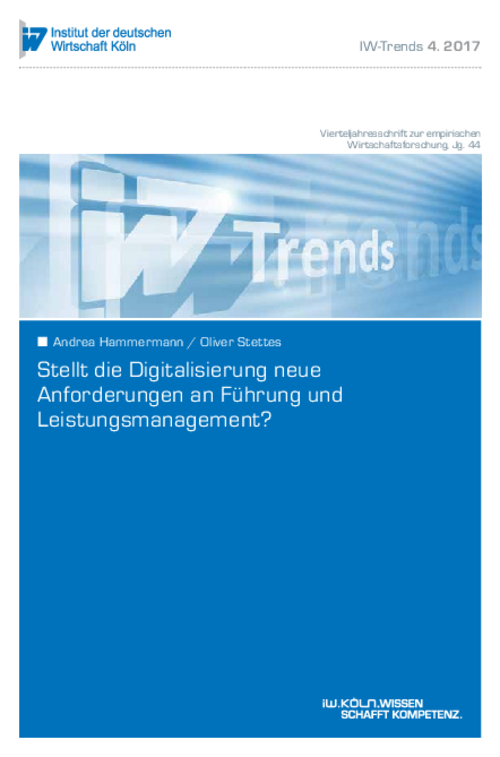Digital transformation has the potential to promote change in the HR policy areas of leadership and performance management. This is suggested by empirical findings based on the IW Human Resources Panel 2017 and the European Working Conditions Survey 2015.

Is Digitalization Placing New Demands on Leadership and Performance Management?
IW-Trends

Digital transformation has the potential to promote change in the HR policy areas of leadership and performance management. This is suggested by empirical findings based on the IW Human Resources Panel 2017 and the European Working Conditions Survey 2015.
The role of managers as drivers and enablers may take on new importance. Four out of ten companies in Germany are convinced that the ability to identify solutions to problems is set to become increasingly vital. Three out of ten attach a great deal of importance to motivational skills. Highly digitalized companies also expect to gain relatively frequent access to new networks by filling vacant management positions with external candidates. It remains to be seen whether this will result in promotion tournaments losing their importance as incentive instruments in HR policy, which would argue for an increased use of result- and performance- based remuneration systems. Employees who work a fair amount on their computers and relatively often outside the office benefit significantly more frequently both from individual bonus systems and agreed targets and from company-wide profit-sharing models. Employees covered by such performance management systems are more likely to feel valued and motivated. However, these empirical findings should not lead HR heads and management to automatically introduce performance- and results-based compensation models in the course of digitalization. They should instead take on the challenge of identifying how different groups of employees respond to flexible compensation models. A further challenge they face is that of selecting the relevant leadership skills and managers.

Andrea Hammermann / Oliver Stettes: Stellt die Digitalisierung neue Anforderungen an Führung und Leistungsmanagement?
IW-Trends

More on the topic

What factors influence the career ambitions of people with disabilities?
Many companies in Germany report having difficulties not only in recruiting employees, but also in filling vacant management positions.
IW
Leadership in transformation: Megatrends and management as a driver of change
Leadership dynamics in companies are subject to constant change in order to meet the challenges of their time. Today, the greatest influences result from developments such as demographic change, globalization, individualization, structural change and ...
IW